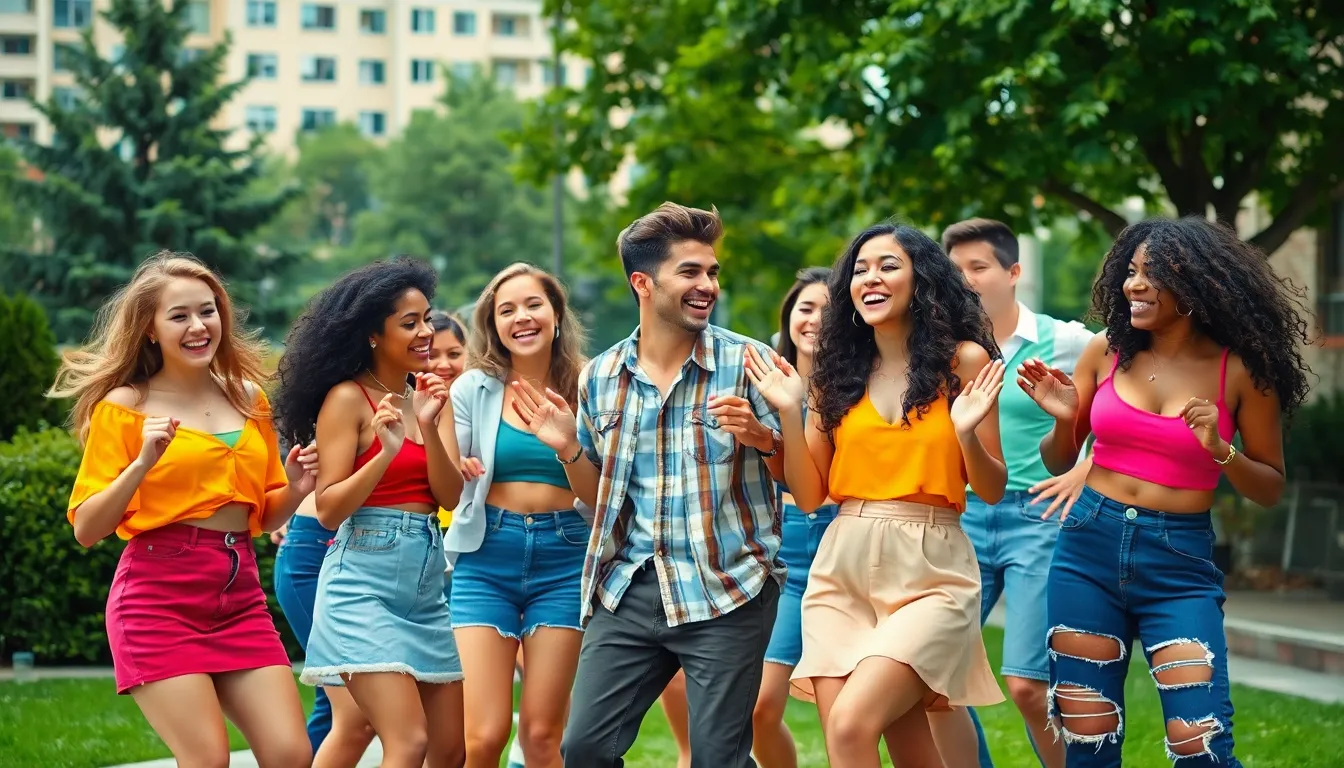In a world where memes spread faster than wildfire and TikTok dances become the new language of cool, net culture trends are the pulse of online life. From viral challenges to the latest TikTok hacks, these trends shape how people interact, communicate, and even shop. If you think you can keep up, think again—this digital landscape is always evolving, and it’s more entertaining than a cat video marathon.
Table of Contents
ToggleOverview of Net Culture Trends
Net culture trends evolve rapidly, with memes and TikTok dances at the forefront of online interactions. These elements shape the way users communicate and express themselves in digital spaces.
Memes serve as a visual language, often conveying complex ideas quickly. Their adaptability across platforms enhances their popularity, making them a staple in online conversations. TikTok dances, on the other hand, emphasize community engagement, as users replicate and remix choreography to create shared experiences.
Influencing shopping behaviors, these trends drive brands to adopt a relatable and humorous approach in advertising. By incorporating meme culture and viral challenges into marketing strategies, companies connect with younger audiences more effectively.
The digital landscape reflects a heightened emphasis on entertainment, where users seek engaging content that resonates with their interests. Instagram Reels and YouTube Shorts also mirror the impact of TikTok, as platforms facilitate quick consumption of trends.
Maintaining awareness of net culture trends proves challenging yet essential. Users must navigate a flood of content that continuously changes, with new trends emerging daily.
Engaging with these trends fosters a sense of belonging among online communities. Participation transcends geographical boundaries, uniting individuals through shared interests.
Overall, net culture trends reshape how people interact, communicate, and consume content, highlighting the significant role of digital platforms in modern society.
Evolution of Net Culture

Net culture has transformed significantly over the years. Understanding its evolution highlights how internet trends shape society.
Early Days of the Internet
Internet culture began with basic forums and chat rooms. Early users connected through platforms like Usenet and AOL Instant Messenger. These spaces encouraged sharing ideas in text-based formats and fostered niche communities. Memes emerged in simple forms, often as images with black text, spreading rapidly through email and early web pages. The novelty of connecting globally created a sense of liberation and experimentation. This period laid the foundation for the rich tapestry of online interactions seen today.
Rise of Social Media
Social media platforms revolutionized net culture. Websites like MySpace and Facebook provided tools for users to express individuality and connect with friends. Content shifted from text to rich media, incorporating photos and videos. This transition enhanced user engagement and led to the rise of viral content. Memes evolved further, becoming more dynamic across platforms like Twitter and Tumblr. Brands began adopting social media strategies to connect with younger demographics, fostering a more interactive shopping experience. Social media reshaped communication, making it faster, more visual, and community-driven.
Current Net Culture Trends
Digital culture flourishes with evolving trends that shape online interactions and experiences. Memes, dances, and the vibrant communities they create significantly influence how users connect.
Memes and Virality
Memes dominate internet culture, serving as quick visual snippets that convey humor or insight. Fast dissemination characterizes their nature, as users easily share them across platforms. The ability to adapt enhances their appeal; memes quickly evolve, often reflecting current events or social issues. Marketers leverage their viral potential, using relatable content to engage younger demographics. Exceptional memes contribute to brand recognizability, fostering a connection with audiences. The impact of memes extends beyond entertainment; they act as a contemporary language, facilitating deeper conversations in online spaces.
Online Communities and Subcultures
Online communities thrive in the current digital landscape. Platforms cater to niche interests, allowing individuals to find like-minded people. Subcultures emerge around specific themes, such as fandoms or hobbies, creating a strong sense of belonging. Engagement within these communities often leads to the formation of unique identities, reinforced by shared experiences. Users participate in discussions, collaborations, and creative projects, further binding them together. The rise of platforms like Discord and Reddit illustrates how these subcultures flourish, providing spaces for deeper connection and interaction among users. Community-driven content shapes online experiences, enriching the fabric of net culture.
Impact of Net Culture on Society
Net culture trends profoundly shape contemporary society through shifts in communication and consumer habits. This influence extends from online interactions to real-world behaviors, making it critical to understand their implications.
Influence on Communication
Communication adapts as memes and TikTok videos become primary forms of expression. Many users now prefer visual content over traditional text, leading to quicker exchanges of ideas. Visual language captures complex emotions with minimal effort, making interactions more engaging. Social media platforms facilitate these exchanges, allowing for rapid feedback and viral trends. Changes in vocabulary also occur, with slang and shorthand evolving to reflect current cultural contexts. Users engage with each other in innovative ways, valuing authenticity and relatability as new norms emerge.
Effects on Consumer Behavior
Consumer behavior transforms as brands respond to net culture’s influence. Humor and relatability in advertising resonate more with younger audiences. Many companies adopt meme-driven marketing to create shareable content, making their products appealing. Fast-paced trends lead consumers to prioritize immediacy over thorough research. Online communities influence purchasing decisions, with peer recommendations and viral trends guiding choices. Brands that engage directly with users on social media cultivate loyalty and foster a sense of community around their products.
Future Predictions for Net Culture
Emerging technologies promise to reshape net culture dramatically. Artificial intelligence tools streamline content creation, enabling users to generate personalized memes quickly. Augmented reality applications enhance social platforms, allowing users to interact with digital content in immersive ways. Blockchain technology introduces new forms of ownership and monetization in digital assets, impacting how communities share and trade ideas. These technologies foster a dynamic environment where creators thrive, engaging audiences with innovative interactive experiences.
Potential social implications arise as net culture evolves. Younger generations may develop shorter attention spans due to the rapid content consumption of visual platforms. This shift influences how individuals form relationships, often favoring digital interactions over face-to-face communication. Moreover, trends in meme culture reflect societal issues, raising awareness about topics like mental health or environmental concerns. The blending of entertainment and activism may define future online communities, prompting users to engage in social justice movements through relatable content. Overall, these implications significantly impact social dynamics, reshaping norms and values in contemporary society.
Net culture trends are redefining how individuals communicate and interact in the digital landscape. The rise of memes and platforms like TikTok has transformed online engagement into a dynamic and community-driven experience. As these trends evolve they not only influence personal expression but also shape consumer behavior, pushing brands to adapt in creative ways.
Looking ahead the integration of emerging technologies will further revolutionize net culture. Users will likely see a blend of entertainment and activism as memes address social issues. This evolving landscape presents both exciting opportunities and challenges, emphasizing the need for individuals and brands to stay agile and connected in an ever-changing digital world.



